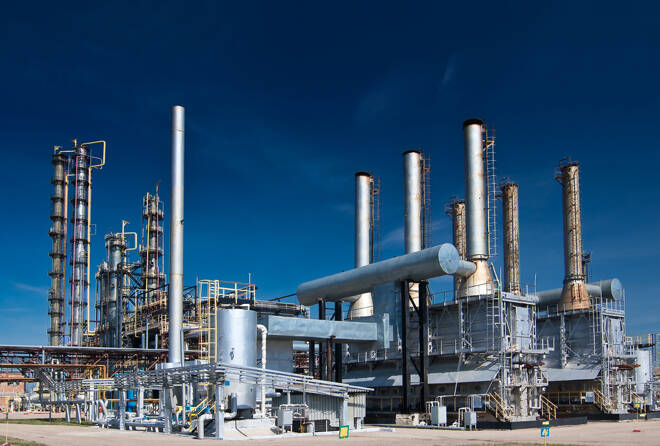Advertisement
Advertisement
Bander-e Jask Oil Terminal Declares JCPOA Dead!
Published: Jul 22, 2021, 13:17 GMT+00:00
Western politicians and US Administration officials can start to rewrite their JCPOA strategies again. Iran has not only clearly chosen to up its nuclear program by increasing its uranium enrichment program, but also has stepped up its efforts to circumvent US sanctions on its oil exports.
In a major ceremony, Iranian president Hassan Rouhani has inaugurated a new oil terminal in the Gulf of Oman. The latter is a very strategic move as it allows for the first time ever Iran to export crude oil and products to global markets without using the Strait of Hormuz shipping route. Rouhani stated that the first shipment of 100 tons of oil is loaded outside the Strait of Hormuz. The new oil terminal in the port of Bander-e Jask allows Iranian and other tankers to avoid entering the Arabian Sea via the Strait of Hormuz.
It also is a direct major strategic change by Iran to decrease US and other navy forces to be able to block Iranian oil and gas exports. The new oil terminal targets a total export potential of 1 million bpd, at a cost of $2 billion. As Iranian oil minister Zanganeh stated to the press, the total project is at 82% of completion, already with an investment of $1.2 billion.
Until now the main oil export outlet for Iranian oil and products was at Kharg inside the Persian Gulf, which is patrolled by US navy vessels. Iran’s export potential has been severely hampered, especially due to navy controls and blockades set up by US and other parties in the Persian Gulf. The last years an increased amount of military confrontations have occurred in the area between Iran’s Islamic Revolutionary Guards Corps (IRGC) and the U.S. military in the area.
At the same time Tehran always has threated in case of a major conflict to block the Strait of Hormuz, effectively blocking Iran and Arab oil and gas (LNG) transport to global markets. Iranian president Rouhani has already stated that the opening of the Bander-e Jask oil terminal option is a clear defeat of US sanctions. Iran and others see the current developments as a weakening of the US options and the threat of a harsher new JCPOA deal.
The latter still is being pushed by Western powers, such as the UK, France and Germany, as these expect the JCPOA to be the only option to keep Iran from developing a full-scale nuclear weapons capability. Since the election of Biden as US president, Western politicians and Iran have been optimistic about a new deal, including the USA, which not only would remove part of current sanctions but also give Iran access to oil and gas markets and open Iranian financial assets currently being blocked.
The negotiations are however in a stalemate, largely caused by Tehran’s unwillingness to cooperate on all levels, while at the same time suspended its obligations under the JCPOA, expanding its nuclear activities and installing new uranium-enriching equipment. In another statement, Rouhani reiterated that Iran is able to enrich uranium at present to 90%, which is weapons-grade.
The election of hardline candidate Raisi as the new Iranian president also has put a stop to the negotiations. Raisi already is facing international calls for legal inquiries in his role in the massacre of Iranian Opposition members in the 1980s.
The opening of Bander-e Jask is not only a normal economic project but a geopolitical strategy of major significance. Iran shows clearly its hardline approach not only to US sanctions or a possible break-down of the JCPOA negotiations but also to its willingness to increase its oil and gas exports the coming months. With or without a JCPOA deal or OPEC support, Iran’s hardliners are not willing to wait. A soft reaction from the West and OPEC should not be expected. Instability and further aggressive moves by Iran’s regime are to be expected.
Possible support for Iran’s oil export expansion is already clear and in the making. China Concord Petroleum Corporation (CCPC), a Hong-Kong based oil trader, could be one of the main new clients. Since the US administration has put sanctions on the company two years ago due to oil deals with Iran and Venezuela, the Chinese party has become a major player in the Iran-Venezuela-China oil trade market. It currently plays the middle man between Iran and Venezuelan oil deals, as both are partly blocked from the international market and financial systems. US government sources are following the black-listed oil deals of CCPC.
In the coming months, it is expected that CCPC will be even more active in the Iran-Venezuela-China triangle. With 14 tankers, holding a total capacity of 28 million barrels of oil, CCPC can be a major partner for Iran. The company is slated to have also links to another tanker, bringing the total to 30 million barrels. Iranian oil exports at present stand at around 600,000 BPD (June), in comparison to 2.8 million bpd in 2018. China and India are the main targets and clients for potential Iranian oil and gas exports the coming years. No other main market is willing to burn their fingers.
About the Author
Cyril Widdershovenauthor
Dr. Widdershoven is a veteran Energy market expert and holds several advisory positions at various international think-tanks and global Energy firms.
Advertisement
